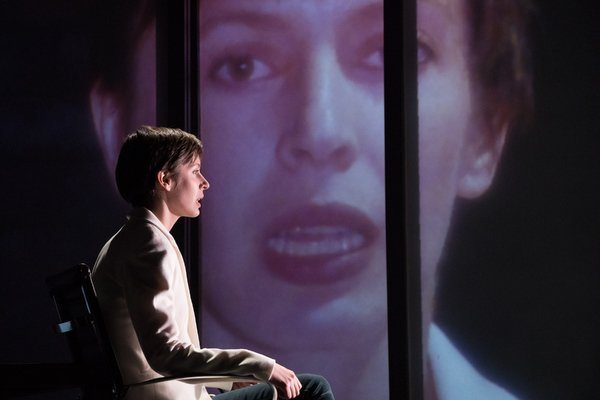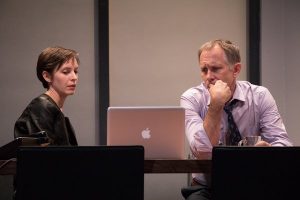

When an investigative journalist at an unnamed magazine is assigned to cover a case of gang rape and rape culture in general at a prominent university, she finds that reporting the truth is not as black and white as it seems. The play Stet, written by Kim Davies, is based on the 2014 Rolling Stone story “A Rape on Campus”, which was ultimately retracted due to reports of journalistic failings and inconclusive evidence that the victim’s story was actually credible. It is about what happens when a quest for a big story can sometimes cloud the judgement of those involved. I spoke with Davies about the scourge of campus sexual assault in America, her development process, and the scarcity of good roles for women.
The timing of this play is remarkable. Were you aware of the Stanford University rape case during the production of Stet?
I don’t think specifically more than I was aware of any other cases that I was following in the research I did for the play. It’s just so much. I don’t think anyone would have necessarily anticipated that that case would have come to such national attention. I think it did because the woman involved in that case made such an articulate statement to the judge and the jury. But there are so many cases like that going on right now. I have this massive Google document that just lists links to those news articles about various cases and there are dozens and dozens of cases going on right now.

What kind of research goes into this type of play? Did you conduct interviews with rape victims?
I do a lot of research for the plays that I write, and I think especially so for this one because from my experience in college, I felt like I had a lot of background on campus sexual assault and the activism culture surrounding that, but I didn't really know much about journalism. So I did speak to some survivors of sexual assault, mostly to get a sense of what the disciplinary process is, the review processes for different schools. Even though all schools to a degree have to follow Title IX, there is very little standardization in how they’re handling these cases. That was really interesting to talk to different people about the processes they had gone through. I also interviewed a lot of journalists.
Did you have access to anyone involved in the Rolling Stone article while writing the play?
Rolling Stone is getting sued right now, they are the subject of several lawsuits, I think two or three people mentioned in the article and the fraternity. The journalist who wrote the article, Sabrina Rubin Erdely, is under a gag order right now and she’s not allowed to speak about the details of the case at all. Someone actually contacted her for me and she had to decline. She is aware that this play is happening.
My primary source for this is the Columbia School of Journalism Review. Rolling Stone invited them to do a kind of post mortem on what had happened, an investigation on what had gone wrong. It’s really detailed about what the process for this article was. Rolling Stone published it and said, well, it’s good to know this happened but it’s not going to change anything we do, we don’t think we actually need to change our process or how the articles get fact-checked or anything. Sabrina Rubin Erdely is still writing for Rolling Stone. She was not fired or removed from her position.
What was the motivation for doing this play, this sort of hyper-realistic parallel to what happened at Rolling Stone?
This started as a collaboration with the Muse Project, which is this initiative started by Jocelyn [Kuritsky], who plays the lead in Stet. The idea of the Muse Project is to give actresses more ownership for the development process and more agency, but also to create more roles for women. Jocelyn felt like she and a lot of her colleagues were entering a phase in their careers where they could see that their male colleagues were still working frequently, but they themselves as women weren’t working as frequently. So the idea of the Muse Project is that they take an actress and they basically say, what kind of role have you always wanted to play but never got to play before? And they try to give the actress resources to make it happen, and that can take a lot of different forms. In Jocelyn’s case, she’s one of the first Muse Project actresses; there have been some others as well. But she was like, I’m really tired of playing ingenues and crazy women. I’d like to play a really intellectual character grappling with a moral dilemma. We talked about the kind of role that David Mamet writes, but they only write those plays for men. What other possibilities for a female character are there in that kind of universe? She interviewed a bunch of writers and she picked me to write it and she picked Tony Speciale to direct it.
Initially, we were just kind of casually developing it and we didn’t have a particular place that it was going to. Back in December, Tony got hired to be the Artistic Director of the Abingdon Theatre Company, so toward the end of December/beginning of January, we learned that Abingdon had a space in their season (one of the plays they had planned for the end of their season had dropped out at the last minute), so they had the space for our production. So he said, even though this play isn’t written yet, we can do this play. At that point I had only written maybe two or three scenes. So it was a very fast turn around.
As we were developing it in the months before that, we had also talked about how we didn’t want it to be a point by point recreation of the case Rolling Stone did. I didn’t want to be limited by that. The sexual assault case that the play centers on now is quite similar to the story in the Rolling Stone case, but I also read a lot of other people’s stories to get a sense of where I wanted to go with that. So I basically spent the last year doing a massive amount of research on campus sexual assault in the United States, which is really depressing.

Jon Krakauer has a book called “Missoula” that he published a year ago that’s really good. That was a really good source. The Washington Post did a series on campus sexual assault last year, I think almost a response to the Rolling Stone debacle. That was really good. The Washington Post was so instrumental in tearing that story apart. One of the big parts of my research was the Center for Public Inquiry in 2010 when Kristen Lombardi and another journalist, Kristin Jones, did an extensive series on campus sexual assault, and that was the first time someone had collected all this data on it and said, this is a pattern. The fundamental reason we even have this conversation happening about campus sexual assault is because of Kristen Lombardi. Someone was able to put me in touch with her and I was able to interview her about her experience. She was also the person who initially broke the Catholic Church sexual assault scandal in Boston. So she has so much experience interviewing victims of sexual assault and she is considered the foremost authority in the country on how to do that, and the ethical way to do that. When the Rolling Stone debacle happened, she was also interviewed as to what went wrong. So getting her perspective was really great, and just getting the perspective of various journalists and what they thought of that article. It was actually really surprising to hear from a lot of people that mistakes are really common, journalism is really difficult, and a lot of journalism nowadays is happening under tight deadlines with few resources. And Rolling Stone is a magazine that still has the money and the resources to do really great investigative journalism, and so it’s really ironic and sad really that they had all the resources needed to get it right and they still failed to really report the story in a truthful way. I also interviewed Claire Gordon, who has also done a lot of reporting on sexual assault and she covered the UVA scandal for Al Jazeera.
So you really did your research! I’m also really interested in the power dynamic between the journalist, Erika, and her editor, Phil, particularly the intergenerational and gender differences between the two. Was it intentional to give them those characteristics or was it merely reflective of the actual story?
No, it’s intentional. Actually, Sabrina Rubin Erdely is about 10 years older than Jocelyn, so she’s in her early-mid 40s at least, and her editor at Rolling Stone is I think in his mid-late 40s/early 50s maybe, so they were much closer generationally. But I knew specifically I was writing the role for Jocelyn, so that character was going to be her age. But I do think it was really important to have the different generational perspective in there and also the friction that comes with that, and like you said the power dynamic. I feel like the cultural attitudes of the Baby Boomer generation are what gave root to the cultural attitudes of my generation. I thought it was important to have that examined in the play.
I was also struck by the ego involved in your interpretation of the story. The ego of Erika for wanting to do a big story, one that would get her the cover of the magazine, and that of Phil for wanting the recognition for breaking such a big story. How much of Erika’s motivations are about ego and how much is about wanting to bring justice for the victims?
I think this is especially true for my generation, but also true for previous generations as well, we’re in a much more outwardly liberal culture than we were even a couple of years ago. Maybe part of this is that I live in New York now. But the kinds of conversations that are happening between people I know and that I see on Facebook, and the conversations I see happening in the press about feminism and sexual assault, I never would have even dreamed that was possible in college. I went to college from 2006 - 2009. But the idea of treating sexual assault as an actual issue that people were willing to talk about it and not treat it as icky or treat it like drama, the conversations radically changed on that. But I think there’s a dangerous thing where the question isn’t so much that people want to do good, as it is driven by their ego and driven by their desire to be seen as good people.

Looking at Sabrina Rubin Erdely’s Twitter and seeing how she very much identifies as a writer who is giving voice to people who otherwise wouldn’t have as much of a voice and exposing injustice, she was really dedicated that way. At the same time, so much of how the Rolling Stone story was handled was so egotistical, it was very much like, I’m going to look for the narrative that I expect to see, the most sympathetic narrative that I think of what campus sexual assault looks like. Something that Claire Gordon pointed out is that the thesis of the Rolling Stone story is that UVA is not doing enough to investigate sexual assault, but Jackie, the person profiled in the story, is not a great example of that because she never really tried to get her assault investigated. She specifically said, I can’t name names, I can’t file a police report, etc. Why would you not follow a victim who had actually reported if you were trying to focus on the inadequacies of the system that students are reporting to? The culture we’re in, and I see it in the way people talk about politics, it’s so much more important to signal that you belong to the right group, and that you have the right thoughts, the right beliefs, than it is to engage in real action. It’s kind of what I’m always interested in about people. One of the things that was really important to me in writing this play is that I don't think any of these people need to be bad in order for this to happen, they just need to be shortsighted.
There is something that Erika says early in the play that she doesn’t think it’s such a big deal, or it doesn’t seem so bad to be raped, and that was so shocking to hear. But then you see her progression as she gets closer to the victims. Do you believe there are many people like Erika who may be sympathetic to rape victims but themselves don’t really see the big deal about it until they get up close and personal to it?
Yes, absolutely, I think probably most people are like that. I think Erika is someone who delights in saying controversial things or giving the impression that she gets to speak her mind whenever. I am plausibly someone who is more sympathetic to sexual assault victims than the average human being might be because of my background but even I’m kind of uncomfortable with a lot of the narratives that surround sexual assault. We don’t really give victims of sexual assault a lot of choice in how they are going to process what is happening to them. There’s a lot of conflicting messages that we send. There’s a really strong narrative that if you were sexually assaulted you are destroyed in a way that you will never really recover from, and that it’s the worst possible thing that can happen to you. I think for some people that is their experience of sexual assault but for a lot of people it’s not. One of the things I find really interesting in this conversation is that sexual assault happens because we as a culture are already so used to exercising so much control over what women do and the choices that women make, and that doesn't stop once we start openly having this conversation about sexual assault. When sexual assault happens we are still really limiting and really directing what victims can say about their experience and how that experience can be used for a political end.
Well, I’m really glad you wrote this play to put a spotlight on sexual assault and the importance of looking at it head on, and also calling out the bad journalism that’s going on such as with Rolling Stone. Do you have any upcoming projects you want to talk about?
My play Smoke is running in Los Angeles right now hopefully through July 16. Right now it’s part of the Hollywood Fringe Festival and a production company might extend it past the festival. The other project I’m focusing on right now is I’m developing a new play in China with a Norwegian company called Ibsen International. They do international theatre and collaboration so I’m one of eight writers from all over the world who are developing new plays in a series of workshops that have been conducted in China. The idea is that all the plays will come together in Shanghai in 2017 for an international theatre festival.
Performances of "Stet" continue at the June Havoc Theatre through July 3.